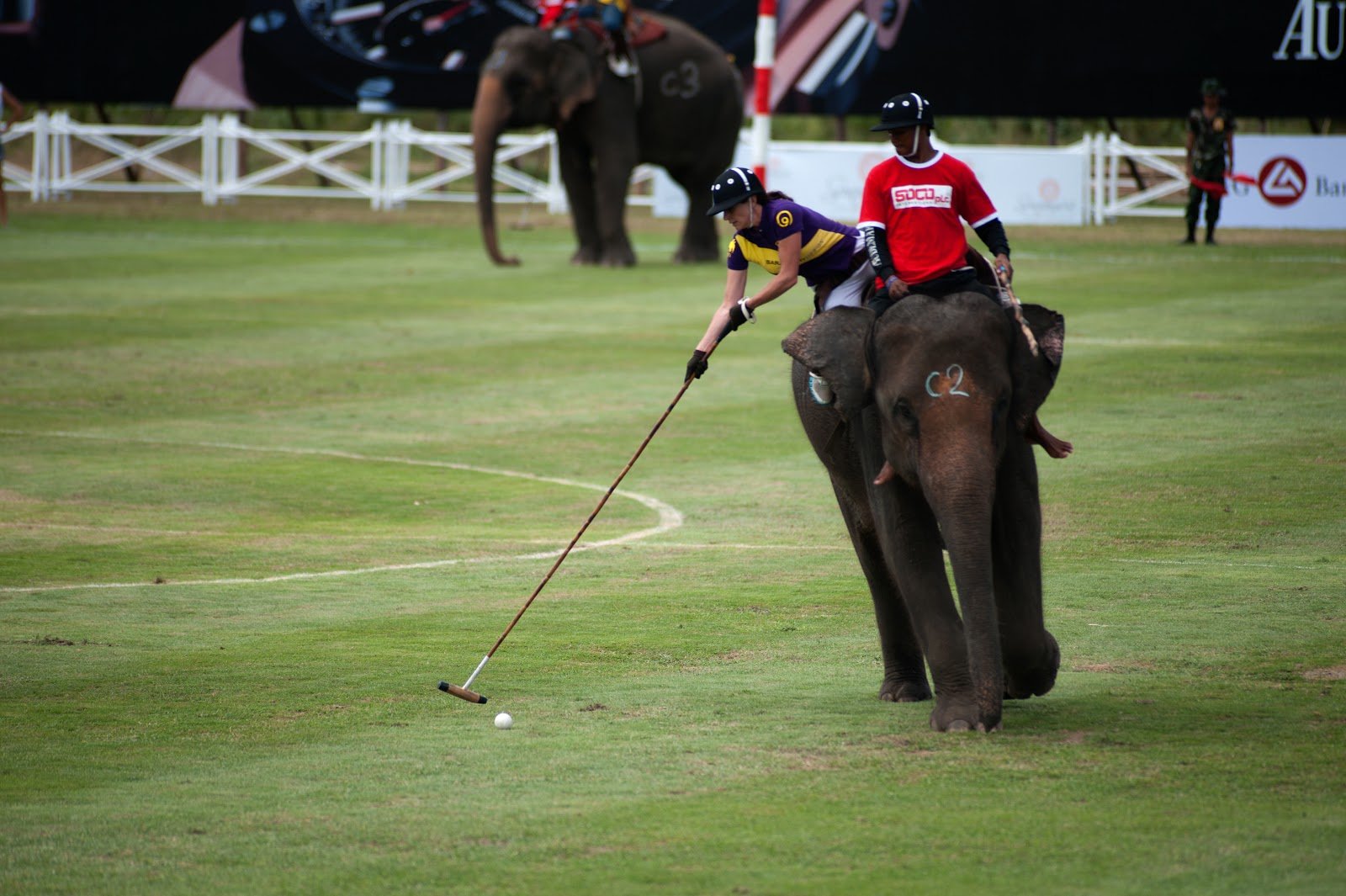Thailand. The King’s Cup Elephant Polo Tournament. A week-long tournament with more than 12 teams – a total of 40 players from at least 15 countries. It’s a sunny day and excitement and music fills the air. Every day of the tournament, the elephants are being fed sugar canes and rice balls filled with vitamins. The mahouts chat over their morning drinks. The elephants are decorated elaborately with coloured chalks.
About 8 elephants have been prepared for the game. They walk onto the pitch. The match begins with Thai dancers dancing on the pitch. Finally, the elephants have been mounted by their players. They carefully pick out their polo sticks. The elephants and the players are prepared on the pitch and are waiting anxiously. The Umpire throws the ball between the two opposing elephants in the ring. A player hits the ball. The game has begun.
The game
As the name suggests, elephant polo is a variation of polo that is played while riding elephants instead of horses. It was mostly played in Nepal, Rajasthan, Sri Lanka, and Thailand and sometimes, in countries like England and Scotland. Elephant polo originated in 1982. James Manclark first suggested playing the game of polo on elephants to Jim Edwards, over drinks. The two British entrepreneurs later introduced the idea to friends and other polo enthusiasts.
Originally when the sport was first played, a soccer ball was used, but that was soon replaced by a standard polo ball. The game was played with a 10-foot cane with a mallet. Unlike a regular pitch used for polo, the pitch used for elephant polo was only three fourth the size of a standard pitch. The mahouts discovered that elephants were quite clumsy creatures and because of their slow movements, a large pitch was not required. Each elephant was ridden by a mahout who guided the elephant, and a player who hit the ball and instructed the mahout on where to move next. The smaller elephants moved quicker and the mahouts and players found them better in attack positions. Although they moved slowly, the larger elephants blocked and defended the goal from the attackers.

Each team consisted of 4 players, 4 elephants, and their respective mahouts. All players had to be right-handed. However, female players were given the exception of using both hands while swinging their stick. A single elephant was placed strategically in the goal semi-circle from both teams to defend the goal. If more than one elephant from a team was found to be near the goal, it was considered a foul. Oftentimes elephants, being the playful creatures they are, would sit or lie down near the mouth of the goal. When this happened, the opposing team would get a penalty shot. Other times, the elephants would kick the ball away or stomp them into the ground. This only meant that the game had to be paused and the ball dug out. No elephant was allowed to use its trunk to pick up the ball, otherwise, it was also counted as a foul. The top two teams from each league proceeded to go to the championship finals.
The game was first officially played in Meghauli, Nepal. Tiger Tops in Nepal was the headquarters and site of the World Elephant Polo Championships. The World Elephant Polo Association (WEPA) set out the rules and governed the tournaments played in Nepal and Thailand. WEPA was quite strict in its rules regarding the game as well as concerning elephant welfare. Elephant polo tournaments elsewhere, such as the ones played in India, were independent of the jurisdiction of WEPA. The King’s Cup Elephant Polo Tournament was first introduced in Thailand in 2001 by the Anantara Resort. Elephants were seen as an important part of the Thai culture and history, and all proceeds were used in ensuring the welfare and medical provisions of the elephants and their mahouts.
The controversy and PETA’s involvement
In 2007, Abey, an 18-year-old elephant went on a rampage during a game in Galle, Sri Lanka and ended up injuring two players.
In 2011, an elephant polo match in Jaipur was cancelled after the sponsor Carlsberg beer withdrew their sponsorship. This decision to withdraw was taken in the light of several complaints from animal rights activists, especially from People for the Ethical Treatment of Animals (PETA). PETA argued that the elephants were held captive and were trained using spikes and pokers. Carlsberg decided to “stop [their] association with this event” after acknowledging the several complaints. “While we comprehend that these specific elephants were in no way being violated, we respect the concern being raised and hence have decided to do the right thing.”
This wasn’t the first time that PETA had filed complaints against the game. All the allegations against the cruel treatment of the elephants resulted in several cancelled matches, sponsorship withdrawals, and, the Guinness Book of World Records had to remove all references to elephant polo.

In a press release, WEPA claimed that there were several benefits to elephant polo. They argued that the domestication of elephants was better than the threats they face in the wild, such as being poached or the loss of their habitat. While the sport claimed to do much for the sake of elephant conservation, several activists found the domestication of elephants inhumane.
The organisation World Animal Protection (WAP) come forward in response to WEPA’s claims. WAP argued that “elephants are not domesticated animals, they are wild animals that are tamed through brutal methods. This seemingly funny and harmless ‘game’ is the result of intense training to ensure the elephants are under full control by humans and trained to perform these unnatural behaviours.”
It was only in 2018 that PETA’s fight finally met its purpose. PETA Asia launched a campaign and gathered footage of handlers beating elephants repeatedly. Thailand Elephant Polo Association had to take the decision to cease having tournaments and announced that they would ban elephant polo in 2018. Since then, Thailand has never hosted a game of elephant polo.
In India, the game was also played during the annual Elephant Festival in Jaipur, Rajasthan. The pressure from various activists and organizations finally put a stop to elephant polo in 2012. According to several sources, elephant polo has run its course and is no longer played anywhere in the world.






1 Comment
Pingback: Myriad Hues of Polo: A Sport That’s No More Limited to Horses – Brown Magazine